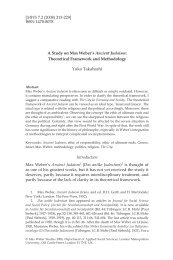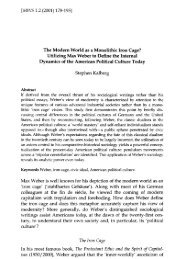Disenchantment, Enchantment and Re ... - Max Weber Studies
Disenchantment, Enchantment and Re ... - Max Weber Studies
Disenchantment, Enchantment and Re ... - Max Weber Studies
You also want an ePaper? Increase the reach of your titles
YUMPU automatically turns print PDFs into web optimized ePapers that Google loves.
12 <strong>Max</strong> <strong>Weber</strong> <strong>Studies</strong><br />
reversible; <strong>and</strong>, not least, of the truth that, in some senses, things have<br />
improved (think, for example, of his account of ‘Citizenship’ in the<br />
General Economic History [1981: 315-37]). But alongside this, there is<br />
always something else too, something which distinguishes him sharply<br />
from both Marx <strong>and</strong> Durkheim. Although <strong>Weber</strong> was not a cynic, his<br />
work is characterized by pessimism <strong>and</strong> a weary acknowledgement of<br />
what the Jedi of Star Wars might call the ‘Dark Side’ of the Force of<br />
modernity.<br />
For <strong>Weber</strong> the disenchantment of the world lay right at the heart of<br />
modernity. In many senses, in fact, it is definitive of his concept of<br />
modernity, ‘the key concept within <strong>Weber</strong>’s account of the distinctiveness<br />
<strong>and</strong> significance of Western culture’ (Schroeder 1995: 228). It<br />
is the historical process by which the natural world <strong>and</strong> all areas of<br />
human experience become experienced <strong>and</strong> understood as less mysterious;<br />
defined, at least in principle, as knowable, predictable <strong>and</strong><br />
manipulable by humans; conquered by <strong>and</strong> incorporated into the<br />
interpretive schema of science <strong>and</strong> rational government. In a disenchanted<br />
world everything becomes underst<strong>and</strong>able <strong>and</strong> tameable,<br />
even if not, for the moment, understood <strong>and</strong> tamed. Increasingly the<br />
world becomes human-centred <strong>and</strong> the universe—only apparently<br />
paradoxically—more impersonal.<br />
<strong>Disenchantment</strong> has two distinct aspects, each utterly implicated in<br />
the other. On the one h<strong>and</strong>, there is secularization <strong>and</strong> the decline of<br />
magic; on the other h<strong>and</strong>, there is the increasing scale, scope, <strong>and</strong><br />
power of the formal means–ends rationalities of science, bureaucracy,<br />
the law, <strong>and</strong> policy-making. However, since <strong>Weber</strong> first discussed<br />
these issues, it has become increasingly obvious that disenchantment<br />
has, at best, proceeded unevenly, <strong>and</strong>, at worst, not at all (although<br />
one could easily substitute ‘best’ <strong>and</strong> ‘worst’ for each other in that<br />
sentence without either losing my meaning, or betraying <strong>Weber</strong>’s).<br />
In this paper I argue that the imperialism of formal-rational logics<br />
<strong>and</strong> processes has been, <strong>and</strong> necessarily still is, subverted <strong>and</strong> undermined<br />
by a diverse array of oppositional (re)enchantments. As a<br />
starting point—I will return to the definitional issue in more detail in<br />
closing—(re)enchantment will be taken to refer to two linked tendencies:<br />
one which insists that there are more things in the universe than<br />
are dreamed of by the rationalist epistemologies <strong>and</strong> ontologies of<br />
science, the other which rejects the notion that calculative, procedural,<br />
formal rationality is always the ‘best way’. Among other things, the<br />
first encompasses everyday explanatory frameworks of luck <strong>and</strong> fate;<br />
long-established or ‘traditional’ spiritual beliefs; ‘alternative’ or ‘new<br />
age’ beliefs; <strong>and</strong> ‘weird science’. The second, more diverse, includes




